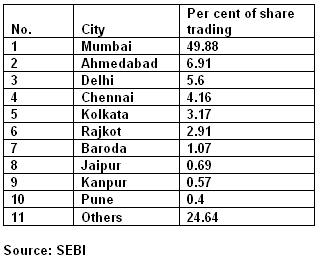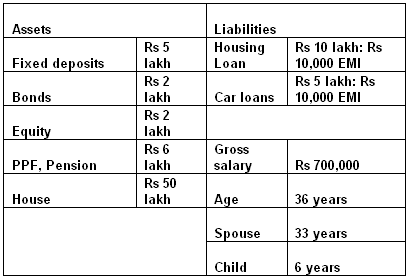
Rationality and careful decision-making is the key to a successful financial plan, says Ranjeet S Mudholkar, CFPCM.
Every individual is faced with situations where s/he needs to make decisions regarding the choices in day-to-day life. The decisions may be of small implications like buying some product for consumption or the ones with bigger implications like deciding the schools or college for one's child to study in. Since the decisions taken have an impact in future it is important that rationality is exercised while making the decisions. Rationality is defined as a state of having good sense and sound judgement.
The situations become more complex when the decisions being taken have financial implications and money is involved in selecting one option or the other. The decision being taken depends on the psychological makeup of the individual, while some individuals are prudent and cautious in nature the other may be impulsive and extravagant in nature. Taking a middle of the path approach is warranted to lead a financially balanced life.
It is important to note here that none of the financial decision is independent; the decisions are interdependent of one another. Increase in financial outlay on one may mean cut down on another. The impact may be immediate or might take some time to show. One impulsive financial decision like buying a luxury car beyond one's affordability may mean compromising on an important financial goal like retirement and has the capacity to hurt the individual for a very long time. Thus it becomes very important to exercise rationality and keep all the financial goals in sight at the time of making any major financial decision. The following could be the highlights that could define the basis on which the rationality in financial decisions can be established.
The writer is working with Financial Planning Standards Board India (FPSB India) in the capacity of Vice Chairman and Chief Executive Officer. The views expressed here are personal, and do not necessarily represent that of the organization. FPSB India is the sole marks licensing authority for the CFP marks in India, through agreement with US-based FPSB Ltd.

Taxation
It also helps an individual rationalise the tax liability by taking maximum benefits as provided in the Income Tax Act, 1961 like section 80C which provides for deductions from the income and section 24, under which interest on housing loan can be deducted from taxable income up to a limit of Rs 150,000 for a self occupied house property while there is no limit if the house is let out on rent.
This becomes even more important in light of the fact that India is predominantly a young country and with the increase in disposable income and life expectancy, the need to manage the money and invest in right places is going to be felt more than ever as defined benefit system gets replaced by defined contribution system for the people working in the organised sector.

Investments
Another aspect of rationality can be discussed in reference to investor behaviour, if an individual is biased towards a particular asset class based on some past experiences or analysis there are chances that one may miss out on the chances presented by other asset classes during the same period. It is correctly said that one should refrain from putting all the eggs in one basket and invest in a well-diversified portfolio to optimise risk and returns.
Behavioural finance
Efficient market hypothesis argues that the information is processed correctly by the investors and is immediately reflected in the prices of the assets. By being rational, investors are expected to update their beliefs correctly by receiving new information and make choices which are suitable to maximise their returns and active management is not required to achieve superior returns to the market.
On the other hand, the proponent of behavioural finance, which is an evolving discipline say that investors are human beings who are subject to range of emotions and information processing errors that may push them to make sub optimal trading decisions. This leads to mispriced assets and inefficient markets, thus investors who understand and avoid these mistakes could exploit the resulting inefficiencies and end up earning excessive returns.
Retail investors often make investment decisions based on herd mentality, i.e., they invest when the market is in bull phase. The idea of long-term investment is yet to be accepted broadly by the Indian investor mindset.

Financial inclusion
It is very important to note that individual financial rationality cannot be established without the entire financial ecosystem being put in right place. This calls for effective market participation by all the stakeholders, effective regulations, ethical behaviour and the financial goals to be established in order. As an example, we see trading in equity markets is very lopsided in our country as top ten cities make for more than 75 per cent of the trading volumes in addition to the fact that the proportion of population investing in equity market is one of the lowest in the global scenario.
A survey conducted by Max New York and National Council for Applied Economic Research (NCAER) on the savings pattern of Indian households reveals that 65 per cent of their savings are kept in liquid assets like bank deposits, post office deposits and cash at home, 23 per cent invested in physical investments like real estate and gold, and 12 per cent in financial instruments.

Thus we can see that Indians are wise savers but poor investors and there needs to be an infusion of financial rationality in the decision making process of the individuals regarding the management of their finances.
The example below would illustrate the infusion of rationality in the financial decision-making by applying financial planning approach.

Given alongside are the financial details of an individual who is 36 year old and the table below demonstrates how the financial planner may help infuse rationality into need identification and prioritising process
Needs can be identified as follows:
Insurance needs
Investment needs
Retirement needs
Tax planning needs
There are several surveys that demonstrate that people spend lot of time in buying consumer and electronic goods like mobile phone, refrigerator, television etc or even clothing and other accessories, however they spend little time on buying a financial product. This calls for suitable attention towards one's own purpose and attitude towards money and setting up right financial goals.
The table below demonstrates the expected prioritising of needs by client and planner respectively.
Photographs: Rediff Archives